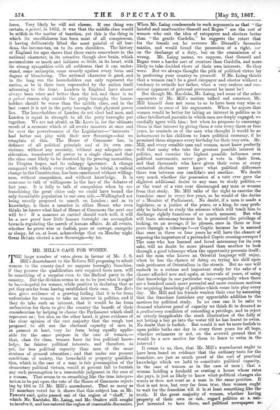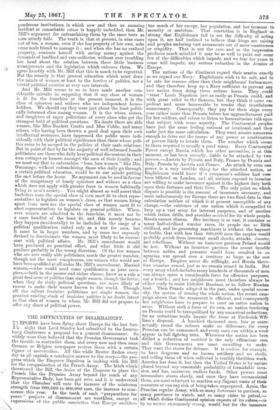MR. MILL'S CASE FOR WOMEN.
IRE large number of votes given in favour of Mr. J. S.
Drill's Amendment to the. Reform Bill proposing to admit women to the county. (and we suppose borough) franchise, if they possess the qualification now required from men, will be something of a surprise even to the Radical party in the country. But therdivision seems to us to be just what it ought to be,—hopeful for women, while positive in declaring that as yet they are far from having established their case. The divi- sion gives evidence of a growing feeling that it is far from unfeminine for women to take an interest in politics, and if they. do take such an interest, that it would be far from unfeminine for them to give the country the benefit of their consideration by helping to choose the Parliament which shall representus ; but also, on the other hand, it gives evidence of the clear opinion of the vast majority that the rough test proposed to sift out the electoral capacity of men is, at present at least, very far from being equally applic- able for the same purpose in the case of women,— that, class for class, women have far less political know- ledge, far fainter political interests, and therefore, as yet, far less political capacity than men of the same stratum of general education ; and that under our present conditions of society, the household or property qualifica- tion, which in the case of a man is fair presumption of the elementary political virtues, would at present fail to furnish any such presumption to a reasonable judgment in the case of a woman. That seems to us something like the true interpre- tation to be put upon the vote of the House of Commons reject- ing by -196 to 73 Mr. Mill's amendment. That so many as 73 members voted for it shows that this subject has, as Mr. Fawcett said, quite passed out of the. region of "chaff," in which Mr. Kerslake, Mr. Laing, and Mr. Onslow still, sought to involve it, and has entered the region of reasonable discussion. When Mr, Laing condescends to such arguments as that "the' hateful and unattractive G-oneril and Began" are the sort of women who suit the idea of ratepayers and electors better than "the gentle Cordelia," he suggests the retort that for the female sex he reverses Mr. Disraeli's favourite maxim, and would found the possession of a right, not on the discharge of a duty, but on the commission of a wrong. Mr. Laing means, we suppose, that Gonerll and Regan were a, harder sort of creature than Cordelia, and more hkelpto take decided views of their own interests. So they were. But we always thought the pith of political virtue lay in preferring your country to yourself. If Mr. Laing thinks that a woman can't be a good ratepayer and elector without a tendency to swindle her father, what a very zealous and con- sistent opponent of paternal government he must be!
But though Mr. Kerslake, Mr. Laing, and some of the other opponents of Mr. Mill's motion talked sad nonsense, Mi.
Mill himself does not seem to us to have been very wise or consistent in some of his arguments. When he argues that women would be better for taking an interest in politics as in other intellectual pursuits in which men are deeply engaged, we cordially agree with him ; but when he proposes to encourage them in that interest by giving them a-vote every three or four years, he reminds us of the man who thought it would be an inducement to his children to learn political economy, if he promised them sixpence every birthday for their very own. Mr.
Mill, and every sensible man and woman, must know perfectly well that many who take the greatest possible interest in politics, and exercise the highest possible influence over political movements, never - gave a vote in their lives, and that thousands who have given their votes at every contested election never knew what political difference there was between one candidate and. another. We doubt very much whether the possession of a vote ever gave the slightest additional desire to any man to study politics,— or the want of a vote ever discouraged any man or woman from that study. Mr. Mill talks of the right to exercise the franchise once in every few years, as he would of the duties of a Member of Parliament. No doubt, .if a man is made a legislator, or a justice. of the peace, or a king, he may prob- ably be induced to study the sciences which will teach him to discharge rightly functions of so much moment. But who will learn astronomy because he is promised the privilege of looking, on an average, if he pleases, once in three or four years through a telescope ?—or Coptic, because he is assured that once in three or four years he will have the chance of exposing the imposture of a pretended Coptic crossing-sweeper The man who has learned and loved astronomy for its own sake, will no doubt be more pleased than another to look through a good telescope when the opportunity presents itself4 and the man who knows an Oriental language will enjoy, when he has the chance o1 doing so, trying his skill upon rash professors of Orientalism in the streets. But no one will embark in a serious and important study for the sake of a chance afforded now and again, at intervals of years, of using that knowledge in one particular way,—especially when there are a hundred much more powerful and. more common motives for acquiring knowledge of polities which come into play every day. Mr. Mill and his ,friends weaken their case by assuming that the franchise furnishes any appreciable addition to the motives for political study. In no case can it be safer to demand whatever proof of capacity we think fit to demand as a preliminary condition of conceding a privilege, and to reject as utterly inapplicable the stook illustration of the folly of not letting a boy go into the water till he has learnt to swim. No doubt that is foolish. But would it not be more foolish to open public baths one day in every three years for all boys, whether swimmers or not, on the avowed ground that it would be a new motive for them to learn to swim in the interval ?
It seems to us, then, that Mr. Mill's amendment ought to have been based on evidence that the ordinary tests for the franchiee, are just as much proof of the sort of practical knowledge which we hold to constitute political capacity, in the case of women as in the case of men ; that a woman holding a freehold or renting a house whose rates she pays, is just as likely to know what political changes she wants or does not want as a man in the same positions If that is not true, but very far from true, then women ought to wait for the franchise till it is at least something like the truth. If the. great majority of women, whether having property of their own or not, regard politics as a sub- ject invented to bore them, and political newspapers as ponderous institutions, in which now and then an amusing incident or remarkable crime is happily imbedded, then Mr. Mill's argument for enfranchising them by the same tests as nien utterly fails. The truth is, that at present, in nine cases out of ben, a woman, even if she has property of her own, asks some male friend to manage it ; and when she has no realized
property, contents herself with saving money against the demands of landlord and rate-collector, without ever troubling her head about the relation between these little business arrangements and the legislation which enforces them. We agree heartily with Mr. Mill that this is much to be regretted. But the remedy is that general education which must draw the minds of women at least to the borders of politics, not a trivial political exercise at very rare intervals.
And Mr. Mill seems to us to have made another con- siderable mistake in supposing that if any class of women is fit for the franchise at the present moment, it is the class of spinsters and widows who are independent house- holders. We should say they were just about the least politi- cally informed class among women. • It is the wives, sisters, and daughters of eager politicians of every class who get the strongest hold of political questions. No doubt there are able women, like Miss Burdett Coutts and Miss Cobbe, and many others, who having been thrown a good deal upon their own intellectual resources, have impressed the public more indi- vidually with their political significance than those whose poli- tics seem to be merged in the politics of their male relations. But in point of fact by far the majority of well informed female politicians are those who daily hear political discussions in their own cottages or houses, amongst the men of their family ; and we must say that to enfranchise "lone, lorn women" like Mrs. Gummage, without enfranchising those who daily go through a certain political education, would be to our minds putting the cart before the horse. No argument can be used in favour of the competency of lonely spinsters and widows as a class which does not apply with greater force to women habitually living in men's society. You might almost as well assert that bachelors were the special class of men most fit to elect repre- sentatives to legislate on women's dress, as that women living apart from men are the special class of women most fit to elect representatives to legislate on general politics. When- ever women are admitted to the franchise, it must not be a mere handful of the least fit, and this merely because they happen (accidentally) to be included in the range of a political qualification suited only as a test for men, but it must be in larger numbers, and by some test expressly devised to discriminate the women most likely to be conver- sant with political affairs. Mr. Mill's amendment would have, produced no practical effect, and what little it did produce probably in the wrong direction. Of the few women who are now really able politicians, much the greater number, though not the most conspicuous, are women who would not have been qualified at all under Mr. Mill's amendment. Married women,—who would need some qualification as joint occu- piers,—both in the poorer and richer classes, know as a rule a great deal more of politics than single women, though the latter, when they do study political questions, are more likely of course to make their names known to the world. Though all the salient feminine politicians are single women, the greatest existing stock of feminine polities is no doubt latent in that class of women to whom Mr. Mill did not propose to offer any share of political power.































 Previous page
Previous page